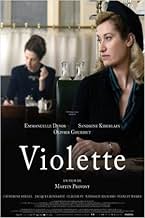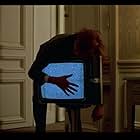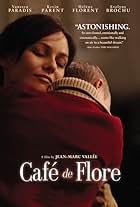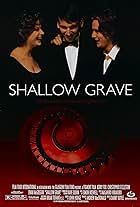Violette Leduc, born a bastard at the beginning of last century, meets Simone de Beauvoir in the years after the war in St-Germain-des-Prés. Then begins an intense relationship between the t... Read allViolette Leduc, born a bastard at the beginning of last century, meets Simone de Beauvoir in the years after the war in St-Germain-des-Prés. Then begins an intense relationship between the two women that will last throughout their lives, a relationship based on the quest for free... Read allViolette Leduc, born a bastard at the beginning of last century, meets Simone de Beauvoir in the years after the war in St-Germain-des-Prés. Then begins an intense relationship between the two women that will last throughout their lives, a relationship based on the quest for freedom through writing for Violette and conviction for Simone to have in their hands the fate... Read all
- Awards
- 1 win & 1 nomination
- Director
- Writers
- All cast & crew
- Production, box office & more at IMDbPro
Storyline
Did you know
- SoundtracksFratres for strings and percussion
Composed by Arvo Pärt
Performed by Tapiola Sinfonietta, Jean-Jacques Kantorow
Maybe one default of this film and others of the genre is that sometimes dialogues are just too good, too literary and cerebral, too much of "for eternity". Specially Simone's, always bright, never trivial. Violette, on the contrary, is much more real, even when she repeats the same idea, moans, quarrels, just suffers or, occasionally, laughs, her character is much more 'alive' and believable.
Simone is like a therapist to poor V., her "life advice" is always right, even if it could be said that she also says it to get rid of V.
Photography is superb, specially Paris buildings and the female character's faces. Only perhaps marred by the "postcard images" of rural France. Music is also enthralling, particularly Avro Part's minimalism, obsessive as Violette. Maybe the score being so repetitive helps us focus on her life, that although seems full of episodes or chapters, they all end up in unrequited love. V. strives for recognition, some money to live and "not being alone", and gets probably only the first two. She repeats "Thins will always be the same", a trademark of depressive thought.
Psychologically, Violette was the poster child of a perpetual victim, always asking for things her partners cannot or will not give, yet she is also manipulative as with Jacques Guérin and also with Simone d B.
Simone treats V. with aloofness yet sometimes looks genuinely friendly with Violette, specially near the end. Yet, Simone speaks disparaging of Violette on at least one occasion, to Jacques: "Violette cannot be friends with anybody, I do it -taking care of her- out of duty".
The script is full of contradictions like the aforementioned or how Violette rebounds from her bouts of depression, or the relationship with her mother - another great actress, totally believable even with an erratic plot-. But great films like this are not made to be analyzed, but enjoyed.
Much as I am a fan of Emanuelle D., I feel she cannot play a woman that was famous for being ugly. Even the way she moves in the beginning at least, she is too much of a "rather nice woman" to play Violette. Sandrine, on the contrary, LOOKS like Simone d B. so much that, like with all good compositions –Kidman's Virginia Woolf on 'the Hours' comes to my mind- we will have the problem after having watched her performance of "always having the mental image of their performance when thinking about the author". Which is in a way, good proof that their acting is truer than life –Kiberlain and Kidman's-.
Martin Provost directed the famous 'Séraphine' but I feel this film is so much better, or at least, so much closer to my heart. Maybe because even if both films deal with artistic genius and rather stubborn woman, both women also with some sort of mental malady, Séraphine seems to struggle in emptiness, whereas Violette has something concrete to fight against, be it the literary establishment that doesn't recognize her, censorship, her long string of bad lovers, her lack of love for herself, her poverty and insecurities. Violette struggles against something, is perpetually in motion, until she cracks.
Séraphine is in a world inhabited by one person only: herself. Violette deals with the country as well as the city, another difference with Séraphine –country only-.
My favourite character is probably Jean Genet's, a lovable gifted rascal with his husky voice and love of life. Unlike Woody Allen's film 'Midnight in Paris', this film enables us to "live through" the characters's perspective, with all their defaults and contradictions. I wouldn't have thought that there was such misery in Paris or that Violette would live in such shabby apartments. They all look brown, dirty and depressing. As I said décor and wardrobe are just incredible, you wonder how did they come along such wonderful dresses. Sometimes I just looked at Violette and SdB.'s clothing, and I know nothing about fashion. I agree with IMDb reviewer ferdinand1932 about the well crafter structure in layers of the script.
This is a film not to be missed if you like French films, Paris and the literary world. A tad long perhaps but beautiful as you will rarely see.
- How long is Violette?Powered by Alexa
Details
- Release date
- Countries of origin
- Official site
- Language
- Also known as
- 盛開紫羅蘭:西蒙波娃與薇奧麗賴朵絲
- Production companies
- See more company credits at IMDbPro
Box office
- Gross worldwide
- $1,493,822
- Runtime2 hours 19 minutes
- Color
- Sound mix
Contribute to this page































